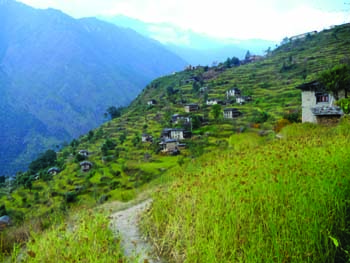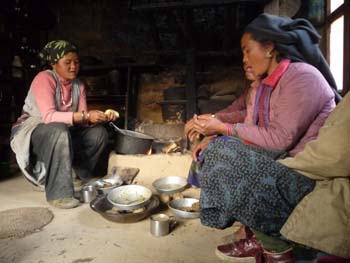 |
Yet Simigaon, while never the site of a battle between the Maoists and state forces, was right on the fault lines of the civil war. By 2001, the Maoists frequented the hills surrounding the village. Initially, plainclothes fighters established bases of operation but as the war progressed, uniformed Maoist soldiers began to appear in the area. The Nepal Army too entered the region and although it had no formal presence in Simigaon, it operated bases nearby and engaged the Maoists in skirmishes around the village.
It is only when one speaks to the villagers that the full extent of the civil war's impact becomes apparent. The emotional baggage of their wartime experiences weighs heavily on the disposition of many Simigaon residents today. When working in the fields, women prefer gossip to talk of politics. But almost every aspect of their everyday lives has been coloured by the shadow of the war.
 |
The village farms grow millet, potatoes, corn, and wheat. Villagers must trek a day to the nearest trading post where they can buy or exchange their produce for rice, peppers, and other commodities. A road was to be built that would have made the exchange of goods much easier, but the war diverted resources and the project remains incomplete today. The trouble does not end with the long walk, either. Once at the trade post, villagers find that goods are much more expensive than they used to be, a result of inflation during the war.
Education is another source of persistent frustration. Kochhiri, a student during the war, explained that during the war the Maoists would often come to the school in Simigaon and interrupt the usual curriculum to teach Maoist ideology. Such intrusions sapped the effectiveness of the already mediocre education system in Simigaon. The effects linger today, both because students fell behind during such interruptions and because without a local VDC, the local school lacks direction and structural support.
And of course, the spectre of violence that haunted the village then has never quite gone away. Leaving the village during the war, while often necessary, was particularly dangerous. Ambushes occurred frequently along the roads and paranoid soldiers could not always distinguish between Maoist fighters and villagers. As Anglakpa, a village leader, explained, explosives were strewn all around the village. The poster in the health centre warning residents speaks of the enduring threat. Maoists often came to the houses in Simigaon demanding food and shelter, and villagers such as Tendi Ama (see box) had no choice but to acquiesce, even though they would be threatened by the Army subsequently.
Coverage of the war has usually focused either on the overarching political aspects of the struggle or on areas where heavy conflict or atrocities took place. Yet there were many more villages like Simigaon that were equally if more indirectly traumatised by the presence of the Maoists and the Army. The residents of Simigaon, like villagers throughout the hills of Nepal, became the pawns of a political struggle far removed from their own lives, and it is stories like theirs that often fall into the cracks of history.
Tendi Ama
 |
Read also:
The Chaukhute post, RUPA JOSHI


